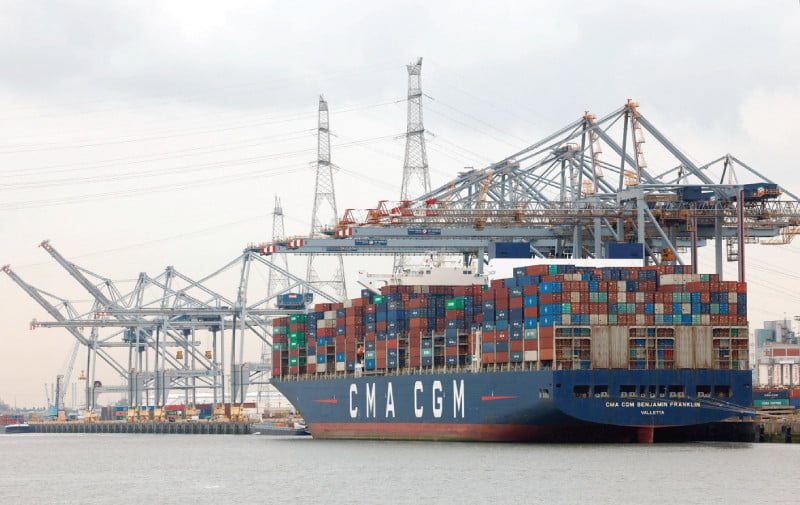KARACHI:
With the humanitarian crisis unfolding in Gaza on an hourly basis and deafening silence in global power corridors, the assumption that the situation will somehow remain contained locally has been proven wrong.
The recent escalation in attacks on commercial ships by Yemen’s Houthi militants has led the oil giant BP (British Petroleum) and four of the world’s biggest container shipping companies, including MSC, Maersk, Hapag-Lloyd, and CMA CGM, to pause transit through the Red Sea, which means they also have to avoid the crucial Suez Canal.
The Red Sea shipping crisis has become a global focal point of concern, particularly due to its profound implications for the intricate web of the global supply chain. This crisis, characterised by heightened geopolitical tensions, security concerns, and occasional blockades, has disrupted the fluidity of maritime trade routes, creating a ripple effect that extends to various corners of the world, including Pakistan.
Understanding the multifaceted effects of this crisis and its specific implications for inflation in Pakistan requires a comprehensive examination of the interconnected dynamics at play.
At the epicentre of the crisis is the substantial delay in the transportation of goods. The Red Sea, a critical passageway connecting major trade hubs and accounting for 12% of global trade, has witnessed disruptions that directly impede the movement of vessels.
These delays, cascading through the supply chain, lead to bottlenecks affecting manufacturers, suppliers, and retailers worldwide.
Businesses, already navigating the complexities of the post-Covid-19 landscape, find themselves grappling with additional challenges in maintaining efficient production schedules and managing inventories, as goods take an extended period to reach their intended destinations.
Compounding these challenges is the surge in shipping costs linked to the crisis. Rerouting of vessels, heightened security measures, and other operational challenges contribute to additional expenses for the shipping industry.
As of last Tuesday, the price to ship a container from China to the Mediterranean was $2,413, having risen 44% in December due to the disruptions, after hitting a low of $1,371 earlier this year, said Eytan Buchman, Chief Marketing Officer at Freightos, a booking and payments platform for international freight.
These augmented costs are not borne solely by the maritime sector but are often passed on to consumers. Consequently, this surge in shipping costs contributes to higher prices for goods and services globally, adding an inflationary dimension to the challenges faced by economies worldwide.
Zooming in on Pakistan, a nation deeply reliant on imported raw materials, LNG cargoes, and finished goods, the repercussions of the shipping crisis are palpable. The delayed arrival of essential goods, encompassing raw materials and finished products, disrupts the delicate equilibrium of the domestic supply chain.
Read More ships carrying oil avoid Red Sea route
Industries reliant on timely imports may experience production slowdowns, impacting economic activities and employment. Sectors such as manufacturing and retail, heavily relying on just-in-time inventory practices, find their operational efficiency compromised. This is going to further deteriorate the already slowing large-scale manufacturing sector.
The inflationary effects of the shipping crisis have immediate and direct implications for Pakistan’s economy. The country, like many others, is already contending with inflationary pressures on various fronts.
The longer journey will cost up to $1 million extra in fuel for every round trip between Asia and Northern Europe, according to estimates from the freight platform Xeneta. Retailers and manufacturers will likely pass on the higher costs to consumers, potentially boosting inflation during a prolonged cost-of-living crisis.
The rise in shipping costs, coupled with delays in the arrival of goods, contributes to an overall increase in the cost of living. Basic commodities, including food and energy, become more expensive, impacting households and potentially leading to social and economic challenges.
In response to these challenges, Pakistani policymakers and businesses are compelled to re-evaluate and adapt their supply chain strategies. There is a growing emphasis on building more resilient and diversified supply chains to mitigate the impact of future disruptions.
This involves exploring alternative trade routes, strengthening domestic production capabilities, and fostering enhanced collaboration with international partners to ensure a more robust and adaptable supply chain.
In conclusion, the shipping crisis in the Red Sea has intricate and far-reaching effects on the global supply chain, with direct consequences for Pakistan. If the disruption continues, it may reverse the down-sloping trend of inflation in the upcoming print and restrict the central bank to be more accommodative in their policy to stimulate an already stalled economic growth engine.
Also, for the common person on the street, due to the sudden rise in energy prices, there is no relief in sight, not at least in the short term.
THE WRITER IS A FINANCIAL MARKET ENTHUSIAST AND IS ATTACHED TO PAKISTAN’S STOCKS, COMMODITIES AND EMERGING TECHNOLOGY
Published in The Express Tribune, December 25th, 2023.
Like Business on Facebook, follow @TribuneBiz on Twitter to stay informed and join in the conversation.
